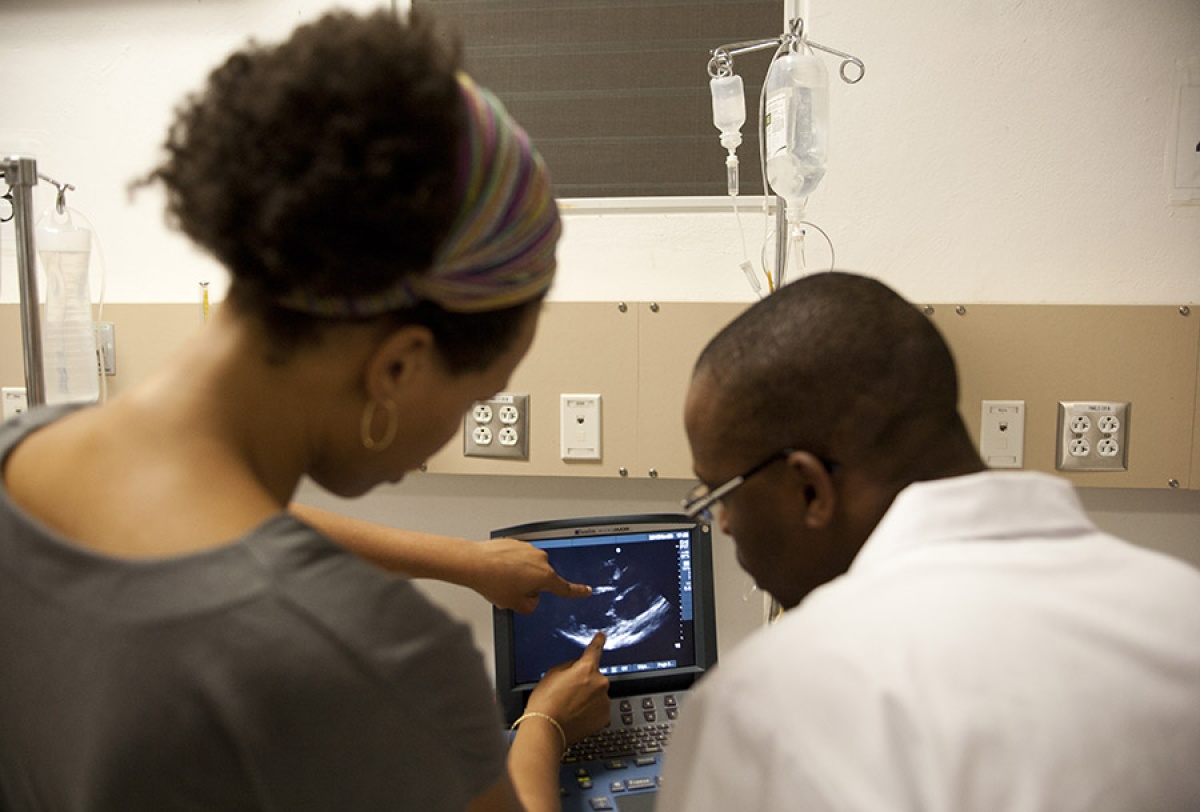Dr. Michelle Morse: A New Mindset for Global Health Training
Posted on Dec 8, 2014

This article originally appeared on Devex.
This November, Haiti’s first ever emergency medicine residents began training at University Hospital, a 300-bed teaching facility born out of the destruction of the 2010 earthquake.
They joined dozens of other residents who are advancing their skills in family medicine, pediatrics, internal medicine, general surgery, obstetrics and gynecology, and nurse anesthesia. In the years and decades to come, the residency program at the hospital, located in the country’s rural central plateau, will allow a consistent stream of young doctors to work shoulder-to-shoulder with experienced Haitian and U.S. doctors, gaining expertise that is sorely needed.
When we consider how to expand access to high-quality medical care, not only in Haiti but around the world, we must also consider access to high-quality education and how to best draw upon the resources of academic institutions in the United States, where a growing number of students are seeking out opportunities to study global health.
This is a relatively recent phenomenon in academia. Consider that the number of global health programs at universities ballooned from just a handful in 1999 to more than 200 today. In fact, global health initiatives on U.S. campuses have roughly tripled every five years since 2000, according to a recent study from the Center for Strategic and International Studies. As a result, colleges, universities and teaching hospitals are developing global health majors and minors for undergraduates, building institutes for interdisciplinary research and teaching, and establishing overseas rotations for medical students and residents.
But too many of these programs verge on neocolonialism, re-creating the dynamics that have historically exploited low-income countries and undermined their capacity to build health systems that provide care for all people.
As a doctor working in Haiti, I’ve talked with several U.S. universities interested in partnerships that offer trainees safe field experiences, or opportunities to provide direct service. Their focus on student experiences results in medical “mission-style” trips, where trainees with inadequate skills visit a developing country for a few weeks and usurp resources such as transportation and human resources for supervision. While these service trips may help students broaden their horizons, they do little to strengthen health systems that provide reliable, high-quality care to patients in need.
Instead of advancing research agendas and creating opportunities for U.S. medical students, universities should contribute to bilateral faculty-led initiatives to strengthen the health system through medical education, improve hospital operations, and work with local clinicians on relevant research questions.
Surgeons-to-be must not be allowed to exploit the surplus of patients in poor countries to fulfill their training quotas.
One of the chief barriers to accessing high-quality care in poor countries is a lack of trained health professionals, a gap U.S. universities can help fill by supporting training programs. Universities are uniquely positioned to leverage the energy and idealism of talented, motivated trainees as a piece of the puzzle in developing structured global health programs. With the right intentions, they can build partnerships led by U.S. faculty that are designed to strengthen medical education and health systems in poor countries that desperately need partners with their expertise.
One such example is the Human Resources for Health program recently launched by the Rwandan Ministry of Health. This program leverages the expertise of U.S.-based academics to build, over the next eight years, the cadre of health professionals Rwanda needs to serve its population. Meanwhile, the Brigham and Women’s Hospital has long collaborated with the nonprofit Partners In Health in Haiti to support and collaborate with local health professionals. We call this approach “accompaniment” to convey long-term, open-ended support that follows the lead of local communities who can best determine where foreign partners and their expertise can add value.
University Hospital is now a training ground offering several residency programs and continuing education opportunities for rotating health professionals to raise the standard of care across Haiti. Building such infrastructure — and leveraging it for teaching and training — wouldn’t have been possible without the support of key partners, including Harvard Medical School and the Haitian government.
Before focusing on their own institutional needs, U.S. academic institutions that wish to offer global health education to their students have a responsibility to focus on building equitable partnerships in developing countries that advance the right to health. Poor countries cannot continue to serve as training grounds for students from rich countries without having the opportunity to strengthen their own health systems. Surgeons-to-be must not be allowed to exploit the surplus of patients in poor countries to fulfill their training quotas. This is what’s at risk when universities create global health programs to meet the needs of their trainees rather than the needs of their partners on the ground.
We stand at a juncture for global health. We can shape the field to do more than repeat the medical missions of colonial days. The good intentions of young people who want to build a more equitable world are a driving force behind the proliferation of global health programs. But to fulfill the promise of global health and truly expand access to modern medicine for all people, U.S. academic institutions and their faculty must provide greater leadership to ensure responsible global health engagement.
Dr. Michelle Morse is deputy chief medical officer for Haiti at Partners In Health. She supports clinical services and medical education systems strengthening at University Hospital in Mirebalais, Haiti.

